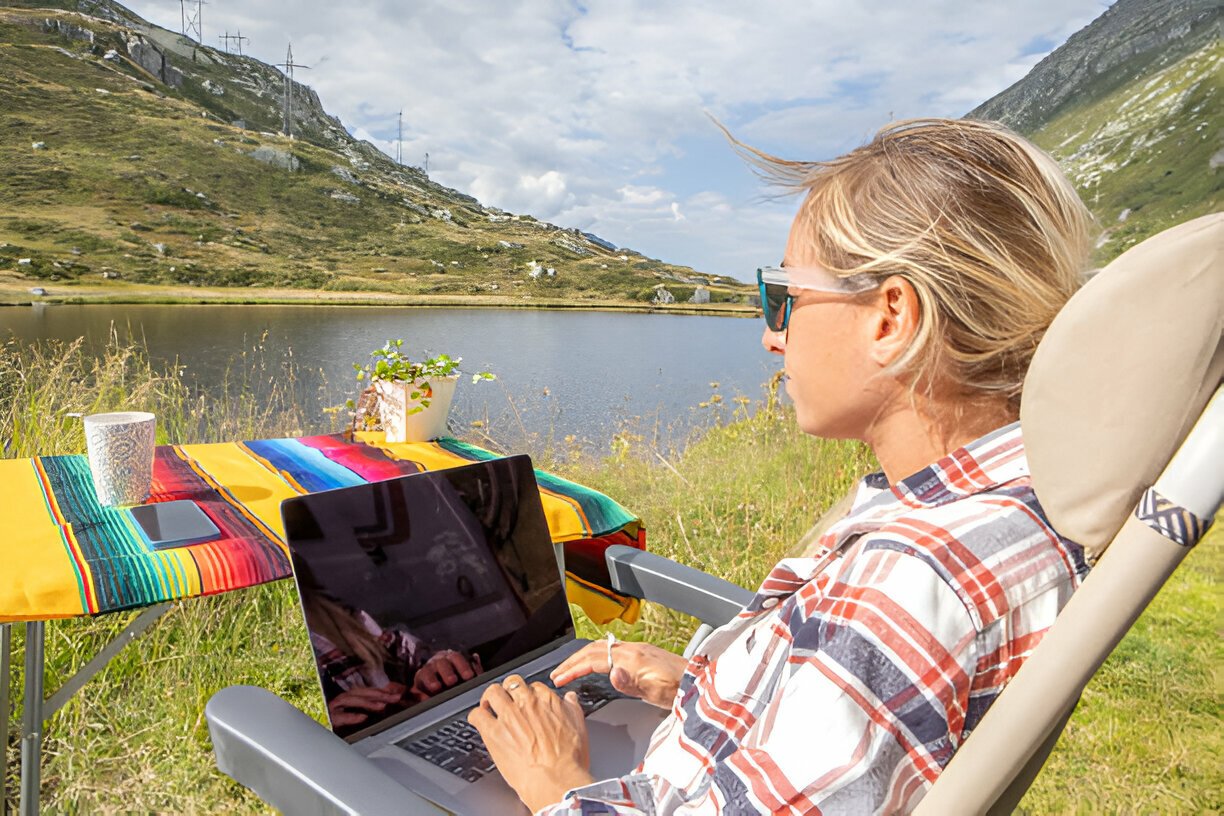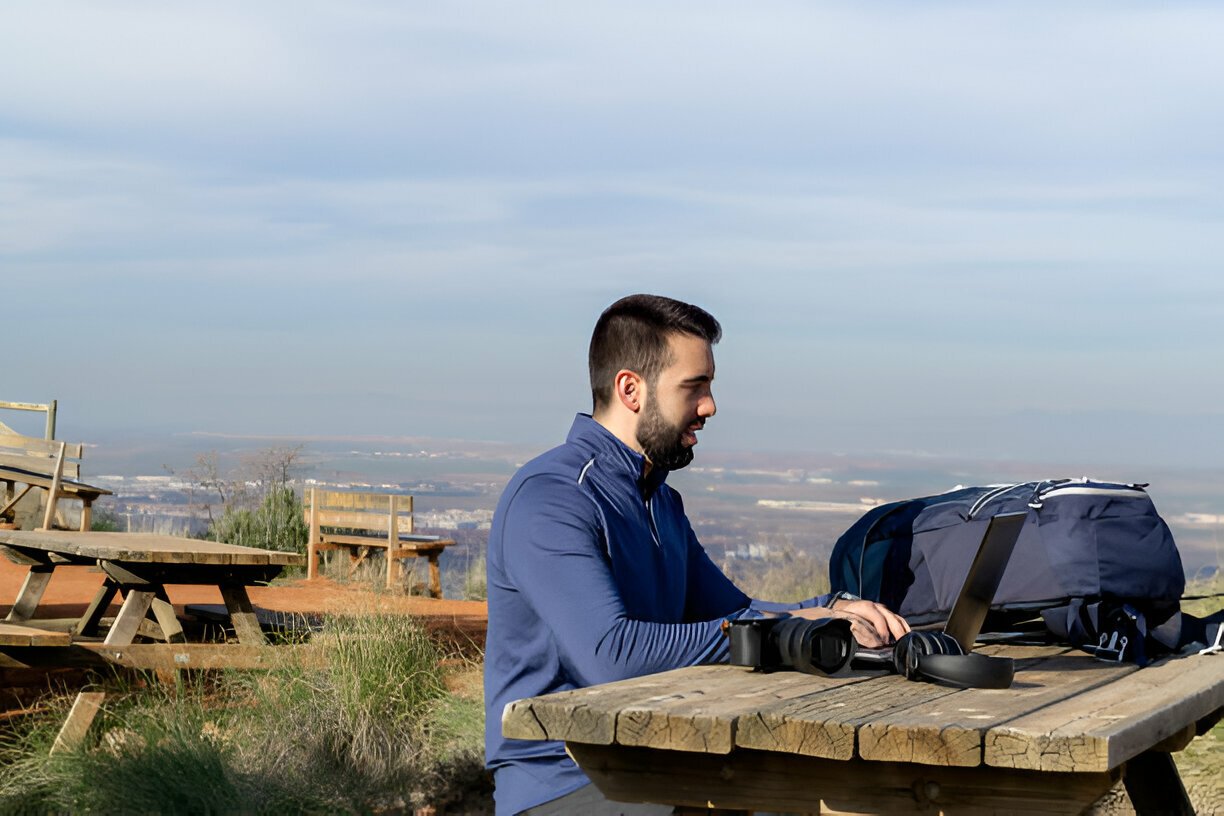Digital Nomad Lifestyle and Remote Work Travel
Introduction
Overview of the Digital Nomad Trend
The digital nomad lifestyle has become a global phenomenon, with an increasing number of professionals opting for a location-independent career. Traditionally, people were bound by office spaces, rigid work hours, and the necessity to live in one place. However, the rise of the internet and technological advancements have paved the way for a new era of work. Digital nomads are people who use technology to perform their jobs remotely, often from different locations around the world. This lifestyle, fueled by the flexibility that digital tools provide, allows individuals to blend work with travel, making it an attractive option for many professionals.
With the increasing availability of high-speed internet and cloud-based tools, it has become easier than ever to work from virtually anywhere. Whether it’s a beach in Bali, a café in Paris, or a co-working space in Mexico City, digital nomads can work from any location that provides an internet connection. This trend has grown significantly in recent years, with many companies embracing remote work as a long-term option for employees, further propelling the digital nomad lifestyle.
How the Rise of Remote Work is Transforming the Way People Travel
The shift towards remote work has had a profound impact on the way people approach travel. In the past, travel was often seen as a break from work, with vacations and time-off being a significant part of many people’s year. Today, the boundaries between work and travel have blurred. Remote work allows people to choose their destinations based on personal preferences rather than professional commitments. Whether working from a tropical island or a bustling city, digital nomads can now explore new places while staying productive.
This transformation has also led to the rise of “workation” culture, where individuals or even entire teams travel to different locations while continuing their work responsibilities. Unlike traditional vacations where the focus is solely on relaxation, workations combine productivity with the opportunity to immerse oneself in new cultures and environments. The flexibility offered by remote work is changing the travel landscape, encouraging a more dynamic and fluid approach to both work and exploration.
Benefits of Being a Digital Nomad

Freedom to Work from Anywhere
One of the biggest benefits of the digital nomad lifestyle is the unparalleled freedom it offers. Digital nomads can choose to live and work wherever they desire, from bustling cities to quiet rural areas or exotic tropical islands. This flexibility eliminates the need for long commutes, office politics, and the constraints of being tied to a single location. The only requirement is a reliable internet connection, which is now available in many parts of the world.
This newfound freedom also allows individuals to create their own work environment, tailored to their personal preferences. Whether it’s a sunny beach or a cozy café, digital nomads can design their ideal workspace wherever they go. The ability to work from various places not only increases job satisfaction but also encourages personal growth through exposure to new cultures, languages, and lifestyles. The autonomy in choosing one’s location is a key factor that attracts many people to the digital nomad lifestyle.
Ability to Travel While Maintaining Your Career
Being a digital nomad allows individuals to maintain their careers without sacrificing the joy of travel. Unlike traditional jobs that often require individuals to take extended time off in order to go on a vacation, remote work gives the flexibility to work while traveling. This means that digital nomads can explore new cities, cultures, and countries without putting their professional goals on hold.
Moreover, the ability to work from different locations often sparks creativity and innovation. Immersing oneself in diverse environments can provide fresh perspectives and inspire new ideas, which can directly benefit a person’s career. Additionally, the opportunity to network globally and connect with other like-minded professionals from around the world can lead to new collaborations, career advancements, and learning opportunities. The balance of work and travel creates a dynamic lifestyle that many professionals now aspire to.
Challenges of the Digital Nomad Lifestyle

Managing Work-Life Balance
While the digital nomad lifestyle offers significant freedom and flexibility, it can also present challenges when it comes to maintaining a healthy work-life balance. When your home is wherever you choose to work, it can become difficult to draw clear boundaries between work time and personal time. Without the structure of an office setting, it’s easy to get caught up in work, leading to long hours and burnout.
Additionally, the constant movement can disrupt routines, making it harder to maintain a balanced lifestyle. The temptation to explore new places and socialize may pull you away from work, while the pressure to meet deadlines can hinder relaxation and downtime. To manage this, digital nomads need to be disciplined about setting specific working hours and carving out personal time. Many nomads also make use of productivity tools and routines to help them stay focused and organized, ensuring that their work doesn’t interfere with their enjoyment of new locations.
Navigating Legal and Tax Issues
Digital nomads often face legal and tax-related challenges when working from different countries. Many countries require specific work visas or permits for foreign workers, and failing to adhere to these regulations can result in fines or deportation. Furthermore, the issue of taxes becomes complicated when a person is living and working across multiple countries. Some countries tax their citizens on worldwide income, while others impose taxes based on where you reside or work.
Digital nomads must stay informed about the legal requirements of the countries they visit, which can sometimes require obtaining professional advice to ensure they remain compliant. Understanding visa rules, tax regulations, and local laws is essential to avoid any legal complications while enjoying the freedom of remote work. Fortunately, there are many resources and communities that help digital nomads navigate these complex issues and provide guidance on how to legally work in foreign countries.
Tips for Successful Digital Nomadism

Building a Supportive Network
For many digital nomads, building a supportive network is crucial to maintaining mental well-being and staying productive. While the lifestyle offers a great deal of independence, working in isolation for long periods can lead to feelings of loneliness and disconnect. To combat this, digital nomads often join online communities or coworking spaces, where they can meet other like-minded individuals, share advice, and create a sense of camaraderie.
Additionally, attending meetups and networking events in various locations can help establish a sense of belonging and open up opportunities for collaborations or new business ventures. Many digital nomads also rely on family and friends to stay grounded, scheduling regular video calls or meetups to maintain strong personal relationships. Building and nurturing these connections is key to staying motivated and supported in a constantly changing environment.
Staying Organized and Productive
The flexibility that comes with the digital nomad lifestyle can sometimes be a double-edged sword, as it can lead to distractions and a lack of structure. To be successful, digital nomads must learn how to stay organized and productive despite the many temptations of travel. This often involves establishing a daily routine that includes time for work, exercise, meals, and relaxation.
Using productivity tools like project management software, time tracking apps, and calendar reminders can help keep tasks on track and ensure deadlines are met. It’s also helpful to choose workspaces that foster productivity, such as quiet cafes, coworking spaces, or rented apartments with dedicated office areas. By creating an environment that encourages focus, digital nomads can balance their work responsibilities with the freedom and excitement of living in new places.
Choosing the Right Digital Nomad Destinations

Best Cities and Countries for Digital Nomads
Choosing the right destination is one of the most exciting aspects of the digital nomad lifestyle. The ideal city or country will depend on personal preferences, work requirements, and the type of experience you want to have. Some of the best cities for digital nomads offer a blend of excellent internet connectivity, a vibrant community, and affordability. Cities like Bali (Indonesia), Chiang Mai (Thailand), Lisbon (Portugal), and Mexico City (Mexico) are popular for their low cost of living, warm climates, and growing number of coworking spaces.
Bali, with its laid-back lifestyle, beachside cafés, and thriving digital nomad community, is a favorite for remote workers seeking both relaxation and productivity. Chiang Mai has long been recognized as a hotspot due to its affordability and welcoming atmosphere for digital nomads. Lisbon, on the other hand, has become a European favorite, with stunning views, a growing startup ecosystem, and relatively low living costs compared to other major Western cities. Mexico City attracts digital nomads for its rich culture, affordable housing, and a variety of coworking spaces catering to remote professionals.
When choosing a destination, it’s essential to research the local infrastructure, cost of living, visa options, and general safety. Each destination offers something unique, so selecting the right place that aligns with both your work and lifestyle goals is crucial for a successful nomadic journey.
Factors to Consider (Internet Connectivity, Affordability, Quality of Life)
When selecting a digital nomad destination, three key factors should be at the top of your list: internet connectivity, affordability, and quality of life.
-
Internet Connectivity: Since remote work depends on a stable internet connection, it’s essential to research destinations known for reliable and fast internet. Cities like Lisbon, Medellín (Colombia), and Tallinn (Estonia) are known for their robust internet infrastructure, making them ideal for remote workers. Check local reviews and ask other nomads about their experiences to ensure you won’t face connectivity issues while trying to meet deadlines.
-
Affordability: Cost of living can vary significantly from one place to another. Some countries, especially in Southeast Asia and Latin America, offer a very affordable lifestyle, which allows digital nomads to enjoy a high quality of life while saving money. Cities like Bali, Lisbon, and Mexico City offer a mix of affordable housing, food, and entertainment, making them attractive for long-term stays. However, it’s crucial to also factor in other expenses such as transportation, healthcare, and taxes to get an accurate picture of your budget.
-
Quality of Life: Beyond work and affordability, the overall quality of life is an essential aspect of living as a digital nomad. Look for places with a good balance of social activities, cultural experiences, public services, healthcare facilities, and opportunities to engage with other nomads. Consider factors such as safety, climate, local amenities, and healthcare options. For example, while Bali offers a peaceful lifestyle, cities like Mexico City and Lisbon offer a richer urban culture and social life.
Setting Up for Remote Work While Traveling

Finding Reliable Wi-Fi and Co-working Spaces
A major part of the digital nomad experience revolves around finding reliable Wi-Fi and coworking spaces that allow you to be productive. Good internet connection is the backbone of remote work, and without it, even the most beautiful destinations can become frustrating. Most digital nomads rely on cafes, coworking spaces, or local libraries for Wi-Fi, but it’s important to research and choose your accommodations wisely.
Co-working spaces are an ideal solution, offering not just high-speed internet, but also opportunities to network with other professionals, attend events, and share ideas. Many cities known for being digital nomad hotspots—like Bali, Chiang Mai, and Lisbon—have a wide range of coworking spaces designed specifically for remote workers. Websites like Coworker or Nomad List can help you find coworking spaces in your destination. Some coworking spaces also offer additional services like access to meeting rooms, printing, and networking events, making it easier to stay connected and productive.
When staying in Airbnbs or hotels, it’s important to confirm Wi-Fi speeds and reliability beforehand. You can often find reviews and feedback from previous guests, which will give you an idea of how reliable the internet is. In remote areas or less developed countries, it might be a good idea to carry a portable Wi-Fi hotspot to ensure you have internet access wherever you go.
Balancing Work with Exploration
One of the biggest appeals of being a digital nomad is the ability to explore new destinations while working remotely. However, striking a balance between work and exploration can be tricky. With so many exciting places to visit, it’s easy to get distracted from your work commitments. To maintain productivity while still enjoying your travels, it’s essential to set clear work hours and goals.
Create a routine that includes set work hours, breaks, and time for exploration. Many digital nomads find success by working in the mornings and leaving the afternoons or weekends free for sightseeing and leisure. Establishing a consistent routine allows you to be efficient with your work while also giving yourself time to enjoy your surroundings without feeling overwhelmed.
Additionally, set realistic expectations about how much work you can accomplish in a new location. If you’re in a new city and excited to explore, don’t overcommit to work tasks. Remember that the joy of being a digital nomad lies in the ability to experience new places at your own pace, so don’t let work pressure take away from the enjoyment of your travels.
Challenges of the Digital Nomad Lifestyle

Time Zone Differences and Managing Work-Life Balance
One of the biggest challenges of being a digital nomad is managing time zone differences. Remote work often means collaborating with teams or clients in different parts of the world, which can create logistical issues. When you’re working across multiple time zones, you may find yourself waking up at odd hours for meetings or struggling to find a time that works for everyone. This can lead to irregular work hours, which may interfere with maintaining a healthy work-life balance.
To manage this, digital nomads need to be strategic about scheduling their work hours and staying organized. Using tools like World Time Buddy or Google Calendar to track time zones can help you plan your day more effectively. Additionally, it’s important to set boundaries with colleagues and clients about the hours you’re available for work. A clear understanding of time zone differences and the need for rest will allow you to work efficiently while preventing burnout.
Moreover, maintaining a work-life balance while constantly moving around can be challenging. Without the structured routine of a traditional office, it’s easy to let work spill into personal time. To combat this, many digital nomads establish routines and set specific work hours, ensuring they leave time for relaxation and exploration. Balancing the demands of work with the freedom of travel is a key skill for digital nomads, and it often requires discipline and self-awareness.
Finding Community and Dealing with Isolation
Another challenge that many digital nomads face is the feeling of isolation. While the lifestyle offers freedom, it can also be quite lonely, especially for those who are constantly on the move. Being away from family, friends, and familiar social circles can lead to feelings of isolation and homesickness. The absence of daily face-to-face interactions with colleagues can also contribute to a sense of disconnection.
To overcome this, digital nomads often seek out community groups, both online and offline. Online communities such as Nomad List, Facebook groups, and digital nomad forums provide support, resources, and opportunities to connect with others living a similar lifestyle. Additionally, attending events like Nomad Summits or coworking space meetups can help build a sense of camaraderie. Many cities also have dedicated coworking spaces where digital nomads can work alongside others, fostering both professional collaboration and social interaction.
It’s also important to make an effort to stay connected with friends and family back home. Scheduling regular video calls or catching up through messaging apps can help alleviate loneliness and create a sense of connection even while living in different countries.
Conclusion

The Future of Digital Nomadism and the Evolving World of Work and Travel
The future of digital nomadism looks promising, as the world continues to embrace the idea of remote work. With advancements in technology, improved global internet connectivity, and increasing support from governments and businesses for remote work, the digital nomad lifestyle is only expected to grow. More companies are offering flexible work options, which allows employees to work from anywhere, leading to a more decentralized workforce.
Additionally, as more countries introduce remote work visas and tailored programs for digital nomads, it becomes easier for people to live and work abroad legally. This growing trend indicates that digital nomadism may become a mainstream way of working in the future, with more people opting for the flexibility and adventure it provides.
As people continue to explore different ways of living and working, the idea of travel and work will become increasingly intertwined. Digital nomads can expect more tailored services, coworking spaces, and even entire cities designed with the needs of remote workers in mind. The future of work is likely to be more fluid, with people enjoying the freedom to work from anywhere while immersing themselves in different cultures and lifestyles.
Encouragement to Try the Lifestyle if You Value Flexibility and Adventure
If you value flexibility, adventure, and the freedom to explore new places, the digital nomad lifestyle could be the perfect fit for you. While it comes with its challenges—such as time zone differences, isolation, and balancing work with travel—the rewards are immense. Digital nomadism offers the opportunity to live life on your own terms, combining work with the excitement of discovering new cultures, meeting new people, and experiencing different lifestyles.
The lifestyle may not be for everyone, but for those who are adaptable, resourceful, and passionate about traveling while maintaining a career, it offers unparalleled freedom and possibilities. With the right mindset, planning, and discipline, you can overcome the challenges and create a fulfilling and rewarding life as a digital nomad.
If you’re considering this lifestyle, take the leap and start small—explore a new city for a few weeks or months, and see how it aligns with your personal and professional goals. With remote work becoming more common and accepted worldwide, now is the best time to try living as a digital nomad and experience the world in a way few others can.
